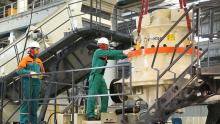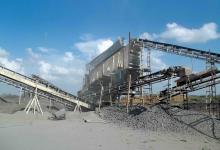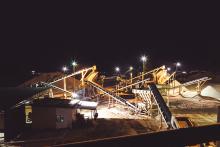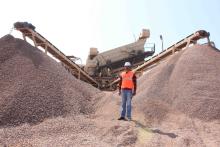Metso has spent the last 25 years establishing a strong market presence in the dynamic and fast-moving Indian quarrying and road construction equipment markets. Guy Woodford visited the global crushing and screening giant’s Metso Park facility and spoke to senior executives at Metso India HQ in Gurgaon, near Delhi, about Metso’s impressive growth in what is the world’s second most populated country, and learnt of the manufacturer’s exciting future plans.
Drive around 150 kilometres south of Delhi and you’ll reach the RIICO Industrial Area in Alwar, Rajasthan, home to
Comprising a mobile plant assembly and test factory, a fabrication and vibrating equipment factory, a rubber factory, a slurry pump factory, a warehouse and container bay, offices, training classrooms and a canteen, the US$33.5 million (€30mn) Metso Park reflects Metso’s major presence in the hugely important Indian market, a market set to be a key driver of global aggregate and quarrying equipment demand for many years to come.
LT1000 series Lokotracks, Nordwheelers, NW Rapids, NP horizontal impact crushers, Barmac vertical shaft impact (VSI) crushers, Nordberg C Series jaw crushers, cone crushers and mobile track-mounted screens for domestic and export markets are all assembled and tested at Metso Park.
The mobile plant assembly and test factory includes an area for engine module assembly and testing, a Lokotrack plant assembly line that uses air pallet technology, a Nordwheeler and NW Rapid plant assembly area and a Lokotrack testing bay. NP horizontal and Barmac VSI crushers are also assembled in the factory.
The site’s fabrication and vibrating equipment factory sees the manufacture and assembly of vibrating screens and various types of feeders for the quarrying, mining and construction sectors. The factory also supplies fabricated components to the assembly factories. It’s equipped with CNC machines, robotic welding, shot blasting, paint booths and drying ovens. The slurry pump factory is where slurry pumps are assembled and tested for slurry transportation in the minerals processing industry.
Metso Park is certified to three integrated management systems:
The site has an impressive employee safety record, as Navin Kumar, VP manufacturing, Metso India, highlights: “From September 2016 onwards, we’ve had no accidents. There was just one between September 2015-2016. This hasn’t just happened. We’ve done a lot of work on health and safety which has led to Metso Park winning a number of national and regional safety awards.
“We also have world class infrastructure here including water recycling and water charging systems. Rain water is collected in eight pits situated around Metso Park and then made reusable onsite. Our power recharging system, which includes extensive onsite solar panel coverage, allows Metso Park to keep running in the event of any regional or national power cut.”
Metso Park products for export worldwide are transported by trucks to either Mumbai or Mundra ports on India’s west coast. Sailings from Mumbai, a five-day, 1,370km truck ride from Metso Park, are more frequent. A three-day, 1,040km journey from Metso Park, Mundra port is used for more standard shipments.
“Transit times and costs will come down considerably with the introduction of one GST (General Sales Tax) in July. This will do away with inter-state taxes and delays, while also incorporating excise duty,” explains Kumar. “The completion of the rail and road freight corridors to Mumbai will also be crucial.”
In 2016, Metso Park produced just over 300 crushing and screening plants, with the figure likely to be closer to 400 this year. Current average machine order lead time has been reduced to almost half of what it used to be prior to the January 2012 opening of the site’s fabrication and assembly and testing factories.
Alongside Metso Park, Metso’s Indian aggregates sector capabilities are supported by a foundry in Ahmedabad, in Gujarat state; service centres in Bangalore and Faridabad, in Haryana state; and the company’s countrywide distribution centre network.
India is home to 1.2 billion people and already has the second largest road network globally, a network having to accommodate an average 15% more vehicles every year. To help reduce often crippling traffic congestion and to better connect scores of cities and towns yet to fully reap the benefits of India’s growing economic might, the country’s prime minister, Narendra Modi, is backing a national road sector investment programme worth more than $90 billion over the next five years. It will increase road building in India to more than 40km a day, which has already risen from 3km a day to a staggering 27km a day. When you add in close to 10,000kms of railways under planning, and the development of port infrastructure around 10 coastal economic regions, there is a vast wealth of opportunities for quarry sector OEM heavyweights like Metso, as well as smaller global, regional and national manufacturers.
Among national transport infrastructure megaprojects is the $33-34 billion National Highways Development Program (NHDP) to upgrade, rehabilitate and widen major highways in India to a higher standard. National Highways comprise only about 2% of the total length of roads, yet carry about 40% of the total traffic across the length and breadth of India. A further $28-30 billion is being spent on state highways which feature some of the works led by UPEIDA (Uttar Pradesh Expressways Industrial Development Authority) and MPRDC (Madhya Pradesh Road Development Corporation). Then there’s $15-16 billion allocated to expressways such as the Mumbai-Vadodara Expressway; $4.5-6 billion being spent on strategic projects such as the Manali-Sarchu-Leh and Nimu-Padam-Darcha India-China border roads; and the $2.3 billion Bangalore-Pune Elevated Corridor.
Metso India is supplying varying numbers of aggregate materials processing plant solutions for many of the country’s megaprojects. In 2016, the subsidiary achieved healthy growth in its aggregates (capital & services) division sales.
“There are many business drivers in the Indian market,” says Sudhir Srivastava, SVP sales & marketing development, Metso. “There is large-scale investment in road and commercial aggregate; subcontracting by construction companies is driving growth in the mid segment. Then there’s railway ballast required for high-speed corridors, and an increasing need for manufactured sand and classification of sand and gravel, due to a ban on using river sand for new concrete road projects. There’s also mid-market growth. Our Indian road aggregate market share is more than 40%.”
Metso has also seen increasing demand in India for its Life Cycle Services (LCS) packages, which offer customers varying degrees of fleet servicing and onsite engineering expertise. As of mid-February 2017, 50 Life Cycle Services (LCS) packages had been sold to Indian customers. “There’s excellent growth potential for LCS linked to the growing number of Metso plant installations in India and ageing machines generating opportunities in parts, refurbishment and repairs. We believe in Life Cycle relationships and assist our customers in optimising their products and process to maximise return on assets,” says Kamal Pajuja, VP, India Market Area, Metso India.
Analysis of the Metso India workforce backs up the company’s confidence in its customer plant fleet servicing offer. Out of its 787 dedicated employees, 84% are engineers. The Metso India employee average age is 36, and the average employee experience is 12 plus years. Furthermore, one in five Metso India employees has more than 20 years’ experience.
L&T (Larsen & Toubro), Dilip Buildcon, Afcons, GR Infraprojects, Madhucon, PNC Infratech, GMR Infra, Thriveni Earthmovers, IRB, HCC and Soma are just a handful of longstanding major Metso India road and commercial aggregate sector customers.
Pahuja explains that Indian commercial aggregate sector customers tend to run family-owned businesses processing around 400,000tonnes/year of material. “They prefer modular plants and demand for sand processing plants is growing. The customers start to gain more road building project work with improvement in supply chain reliability.”
Speaking of Indian road sector customers, Pahuja adds: “They are looking for timely completion of jobs. Plant availability and production volumes are major drivers in buying decisions. For smaller companies, sub-contracting is a preferred way of working. Road sector customers prefer 200 to 250 tonnes an hour capacity plants, that are technology-driven and can produce aggregate products to particular specification.”
Pahuja says the widespread adoption in India of EPC (Engineering-Procurement-Construction) and TOT (Toll-Operate-Transfer) models for road building and road tolling respectively has reduced bureaucracy and other difficulties associated with the BOT (Build-Operate-Transfer) model favoured in the country up until 2015.
As I talk to Srivastava and Pahuja at Metso India’s modern corporate HQ in Gurgaon, near Delhi, the conversation turns to the establishment of the subsidiary in November 1992. Srivastava smiles as he remembers life as one of the first employees. “There were five of us operating out of a business centre with just four desks, so one of us always had to be on a customer call. From there, we started to build brick by brick. We got our first production unit and then got to work across the whole country. Where we are now is our fifth [corporate] establishment in our history.”
Back analysing current times and looking ahead to the future, Srivastava notes that India, Europe and North America represent the biggest current aggregate sector growth markets. “What’s been impressive with our company and our people here in India is the ability to keep pace with all the market change. We are worldwide leaders in equipment, technology and service development, and in the investment we make in our people. That’s very satisfying.”









